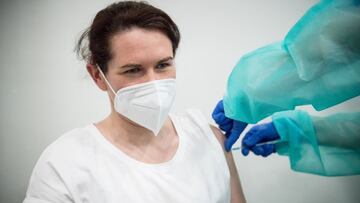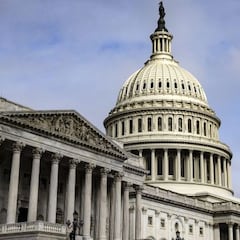Coronavirus US: Is the first dose of Moderna more effective than Pfizer´s?
Both the Moderna and Pfizer covid-19 vaccines provide initial protection against the virus after the first shot but experts recommend getting both.

As nations race to vaccinate their populations against the covid-19 virus, there is a debate over whether to hold off on the second shot in order to vaccinate more people. Between the two that require a double dose, Pfizer’s and Moderna’s, which one provides more protection?
Of the three vaccines that are currently available in the US, only Johnson & Johnson can be taken as a single shot. However, its protection is slightly less than the two that require two shots, but its clinical trials were performed in an environment where multiple variants were circulating. Nevertheless, it provides more than adequate protection against covid-19 and for those that hate needles, a relief to avoid a second jab.
-
What are new CDC guidelines for schools?
-
How to claim the enhanced Child Tax Credit
-
Children born in 2021 could be eligible for a stimulus check
-
IRS tax filing 2021 date change: what's the new deadline?
The Moderna and Pfizer vaccines provide similar protection after one shot
In an editorial in the in the Timmerman Report, virologist and leader of the COVID-19 Prevention Network (CoVPN) Operations Center Dr. Larry Corey said that data showed that the Pfizer vaccine was slightly more effective than the Moderna vaccine after the first shot. The Pfizer vaccine provided a 50% serum neutralization titer of 29 from protective antibody levels at day 21 after the first dose. The Moderna vaccine provided a serum neutralization titer of 18. A level of 29 is equal to a low-dose convalescent plasma treatment.
In his view this is too low as research has shown that “low-dose convalescent plasma is associated with more harm than good – it is associated with being a precursor for escape variants to emerge among immunosuppressed persons.” For this reason, he argues for the two-shot strategy. By two weeks after the second vaccine dose the neutralizing antibody titers were up to 437 for the Pfizer vaccine and 344 for the Moderna.
One Shot or Two? Read why virologist Larry Corey believes it's best to stick with the two-dose vaccine regimen. @fredhutch @uwmnewsroom https://t.co/1chueuG6JJ
— Luke Timmerman (@ldtimmerman) March 14, 2021
How effective are the vaccines after one shot?
There has been good news out of Israel which has had one of the most successful vaccination campaigns with about 57% of the population of 9 million now having received at least one dose of the vaccine and over 48% fully immunized. The country has been using both the Pfizer and Moderna vaccines and has seen infection rates drop to less than a quarter since its record levels in mid-January.
Looking at the data from the vaccination campaign at the Sheba Medical Center of its nearly 10,000 staff members, a single dose of the Pfizer covid-19 vaccine is highly effective. Before the second dose was given on day 21 those who received the first shot of the vaccine had a range of protection between 52% and 97%.
However immunologist and Professor of Medicine at the University of Virginia, William Petri, still urges people to follow the CDC guidelines and receive both doses.
Waiting to get the second dose of the vaccine
Related stories
The scheduled timetable to receive the second dose of Pfizer’s vaccine is 21 days and Moderna’s vaccine is 28 days. The CDC considers 42 days, or 6 weeks, as the allowable interval between the first and second dose should it not be feasible to adhere to the recommended interval.
Dr. Larry Corey argues to “stick to the with the proven two-dose regimen.” In his view, even though the Pfizer and Moderna vaccine can provide around 50% protection against covid-19 after one shot, it would be better to have the 95% protection the two doses provide. The reason is the extra levels of immunity that the additional dose provides, especially in the face of the more contagious variants spreading. By only getting one dose, the virus has the opportunity to develop in the host and escape in the form of a new variant.


